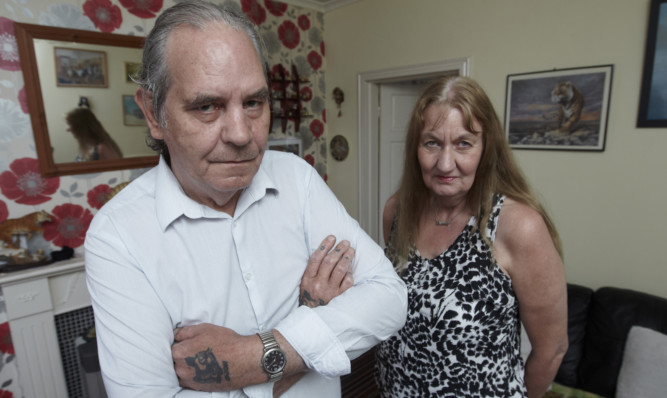
As we launch new campaign, shock probe reveals the postcode lottery over treatment.
Cancer patients are facing a life-or-death postcode lottery over delays in getting treatment.
As The Sunday Post today launches its Fighting Chance campaign, demanding faster treatment for sufferers of the disease, an investigation has revealed:
Some patients being forced to wait 30 weeks before cancer treatment starts.
Sufferers of common cancers including testicular, prostate, kidney and bladder, given a raw deal compared with other forms of the disease.
People making numerous visits to their GP before being referred to a specialist.
Targets for treating urgent cancer cases repeatedly missed and by an increasing margin.
A postcode lottery which sees some health boards beset by unacceptable delays in starting life-saving treatment.Join our campaignJanice Preston, of cancer charity Macmillan, said: “We know early diagnosis and treatment creates the best outcomes for cancer patients, so any increase in waiting times is concerning. It’s important all health boards in Scotland work towards matching the best performing areas.”
Targets set by the Scottish Government dictate 95% of patients diagnosed with cancer must have their first treatment within 31 days of a decision to treat. However, patients urgently referred with a suspicion of cancer, which is later confirmed, must have treatment within 62 days.
Mortality rates for major cancers including breast, lung and bowel have improved significantly over recent years and health boards are consistently meeting their 31-day goal. But they are missing the crucial 62-day target and by an increasing margin.
During the first quarter of 2013, 94.5% of patients were treated within 62 days but by the first quarter of this year it had dropped to 91.5%. The declining performance has accentuated a worrying postcode lottery over people’s chances of starting treatment fast with nine boards falling short.
Among the worst performers was NHS Grampian which managed just 85.6%. In Shetland 86.7% were treated on time and Forth Valley recorded 87.5%.
By contrast Orkney scored 100%, the Borders came in at 96.7% and in Dumfries and Galloway it was 96.2%.
In some of the most extreme cases patients are being forced to wait for up to 30 weeks before doctors set about battling their cancer.
Cancer patients in Scotland also often endure far longer delays for potentially life-saving tests than their European counterparts. Studies have shown those suspected of having the disease can wait weeks before being seen at hospital. In contrast, cancer patients in Sweden are sent to a specialist straight away.
To make matters worse, patients often have to go to their GP several times before they get a referral. One study in Scotland found teenagers with cancer are frequently dismissed by doctors for having something far less serious.
Experts claim these delays are a significant reason why survival rates for cancers like ovarian have been as low as 33.5% in recent years, when they have a 92% survival rate if caught early.
Dr Jean Turner, of the Scotland Patients Association, said: “It’s bad enough people are waiting 62 days for treatment but once you start crawling over 62 it is getting unreasonable. Boards need to hold their hands up about what is happening.”
Meanwhile, it has emerged the disparity over the speed of treatment is not just dependent on where patients live but the type of cancer they have.
Statistics show urology patients which includes testicular, prostate, bladder and kidney cancer are waiting longer for treatment than with other forms of the disease. In the first quarter of this year just 83.4% of urology patients started treatment within 62 days, 8% below Scotland’s 91.5% average, and a massive 11.6% below the Government’s 95% target.
Only two other cancers scored below 90%: head and neck which treated 88% of patients on time and ovarian which treated 88.6% on time.
Urology was also the only type of cancer which slipped well below the 31-day cancer target, with just 91.2% of confirmed cancer patients treated within a month.
A Scottish Government spokesman said it is committed to supporting people through every stage of cancer diagnosis and treatment and ensuring they receive the best care as quickly as possible.
He added: “Once a diagnosis has been made and agreement is reached with the patient about the best option, treatment takes place on average in less than a week. Diagnosis and treatment varies depending on the type of cancer a patient has.
“As we learn more about cancer and testing advances at a pace, diagnosis can become much more complex and this may affect the length of time taken to reach a conclusion. But it is crucial to ensure the most effective treatment for every individual patient.
“We are also working to support challenged boards to ensure patients get swift access to treatment.”
Around 30,000 Scots are diagnosed with cancer and the numbers are increasing every year.

Enjoy the convenience of having The Sunday Post delivered as a digital ePaper straight to your smartphone, tablet or computer.
Subscribe for only £5.49 a month and enjoy all the benefits of the printed paper as a digital replica.
Subscribe